“Train to Busan Presents: Peninsula” (반도)

What “Peninsula” lacks in humanity is made up with spectacular car chases and firearms. Is it as good as “Train to Busan”? No, but it’s good enough, in a Hollywood shoot-em-up kind of way.
Journalist, Author & Syndicated Columnist

What “Peninsula” lacks in humanity is made up with spectacular car chases and firearms. Is it as good as “Train to Busan”? No, but it’s good enough, in a Hollywood shoot-em-up kind of way.

Once “Seoul Searching” gets past the caricatures, the story delves into the deeper meaning of what it means to be Korean in societies that view you as a perpetual foreigner. Though the film concentrates on Korean Americans, two of the more memorable characters are Korean teens raised in Germany (Klaus, played by Teo Yoo) and Mexico (Esteban Ahn’s Sergio).
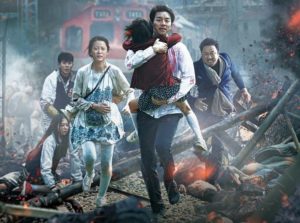
“Train to Busan” does a great job at depicting how people deal with death during unthinkable times. When your loved one is infected and your only option is to perish (as human beings) with them or kill them so that you (and others) can survive, what would you do?
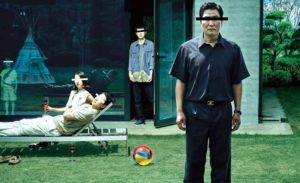
“Parasite” has already made history for South Korea as the country’s first film to win a Best Picture Academy Award. There are some moments I can’t wrap my head around though, and one of them was the inclusion of Illinois State into the dialogue.

MTV News interviewed me for this piece on how differently “Parasite” director Bong Joon-Ho and BTS are viewed by critics.
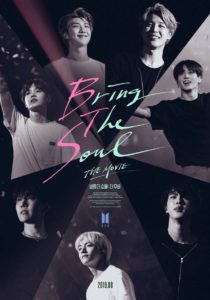
BTS will be back on the big screen this summer. The Korean pop group announced today that their latest feature film, “Bring the Soul: The Movie,” will have a global release on August 7. It arrives just six and a half months after the septet’s last film release, “Love Yourself in Seoul.”
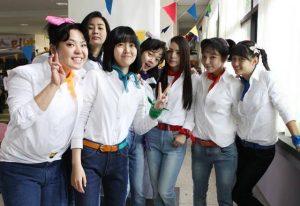
Released in 2011, “Sunny” focuses on a group of middle-aged women, who reunite to fulfill their terminally-ill friend’s wish to see them all together again. The premise sounds maudlin, but deftly directed by Kang Hyeong-Cheol, the film moves seamlessly between the women’s current lives and their (relatively) care-free high school days.

“Burn the Stage: The Movie” is a taut, entertaining look at BTS — the world’s most famous boy band. While the music, choreography and comic elements will endear the group to moviegoers, it’s their kindness that I remembered long after I had left the theater.

“My Love, Don’t Cross That River” is a love story that shows there is beauty to be found in everyday life, even with death looming. A languid documentary about an elderly couple that has been married for more than 70 years, the 86-minute film — which is both tranquil and heartbreaking — is deftly directed by Jin Mo-Young.

If you could re-live a part of your life, knowing that the time you had with your loved ones would be fleeting, would you risk it? The Korean feature film “Be With You” (지금 만나러 갑니다) offers this intriguing concept. It wasn’t perfect, but it made my heart hurt … and happy.
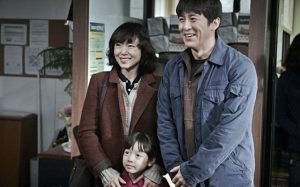
The first Korean film to be shot in the Caribbean, “Way Back Home” was shot in a real women’s prison, with some of the actual guards and detainees serving as background characters. The filmmakers clearly believe that while Jang Mi-Jeong (the woman on whom the movie is based) may have been guilty, her crime was less egregious than the way the Ministry of Foreign Affairs handled her case.

In a review that ran in the New York Times, film critic Jeannette Catsoulis gave “Ode to My Father” a big thumbs down for being “syrupy” and for having “packaged pain … likely to leave Western audiences cold.” While there is no doubt that director Yoo Je-Kyoon would’ve loved for American audiences to embrace his movie, it’s also undeniable that this film was not made with Western moviegoers in mind. It was made for Koreans.

“Secretly, Greatly” starts off as a comedy and veers off into a drama with a graphic, violent ending. Had the film stuck to one genre, the result would’ve been more cohesive and effective. Still, it’s a worthwhile film that will keep viewers on the edge of their seats. Kim Soo-Hyun shows impressive range in his dual portrayal of a North Korean spy and the dimwitted village idiot that’s his cover.
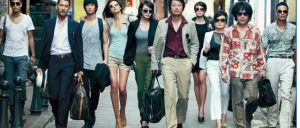
A blockbuster hit in Korea, “Thieves” features an all-star cast that includes Jun Ji-Hyun and Lee Jung-Jae. (The duo shared the big screen in the 2000 film “Il Mare” — the film that was later remade as “The Lake House” with Keanu Reeves and Sandra Bullock.)

Don’t let this sunny photo fool you. “Always” (오직 그대만) just about broke my heart. Both So Ji Sub and Han Hyo Joo are appealing in their roles. They convey the right emotions, without being maudlin or resorting to histrionics. Some might say that the ending was cheesy, but I found it to be delightful and full of hope.

Released in 2004, “Once Upon a Time in High School” is set in 1978. During this time-frame, South Korea was ruled under the brutal dictatorship of Park Chung-hee (the father of Korea’s current president Park Geun-hye). The movie depicts a bleak period where students had few rights and teachers could beat them at will. There’s a trickle down factor to that kind of abuse. The boys settle their differences not with words, but with fists, chairs and bats.

A huge hit in South Korea, where it was filmed, “Miss Granny” doesn’t have a unique plot. But, director Hwang Dong-hyuk deftly takes an old premise (an elderly woman finds herself magically transformed into a 20 year old) and adds some new twists and social commentary. The result? A charming comedy full of music and scenes that will tug at your heart.

So, what the heck is a Pororo, you ask? If you can’t tell by the cover, it’s an adorable little animated penguin. In South Korea, where the “Pororo The Little Penguin” series made its debut in 2003, it’s the show for the preschool/kindergarten set. While it airs in more than 80 countries around the world (including Brazil, Australia, France, India and the United Kingdom), the show never made a concerted effort to break the U.S. market.

“Doggy Poo” is based on Kwon Jung-saeng’s 1968 children’s book of the same name. During that time period, South Korea was still in the process of recovering from the Korean War. It was still decades away from becoming the high-tech, wealthy country it is today. And I can’t help but wonder if the book wasn’t an allegory for how its citizens must sacrifice themselves (brutal work conditions, relentless hours spent studying at school) for the greater good of the country.

A “critic” at a publication I never heard of suggested that I not write reviews for films that I didn’t like. For real. He really said this. He didn’t seem to understand that at the Chicago Sun-Times (where I was employed at the time), editors didn’t give reporters the option of only writing about things that they liked. He argued with me about it until I finally just stopped responding to his emails. Who was he? Honestly, I can’t even remember.